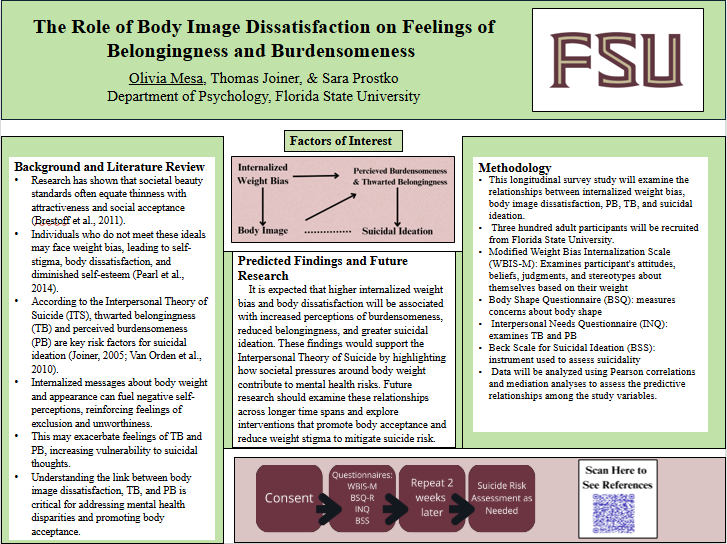Research Symposium
25th annual Undergraduate Research Symposium, April 1, 2025
Olivia Mesa Poster Session 2: 10:45 am - 11:45 am/ Poster #223

BIO
My name is Olivia Mesa, and I am a junior pursuing a double major in Psychology and Social Work. I have a passion for counseling and clinical research, and I am getting to perform this work with my research assistant position in the Joiner Lab. During my time as a research assistant, I have worked on virtual reality scenarios regarding people's decisions on suicide. In the future, I would like to be involved in crisis work and help those facing
The Role of Body Image Dissatisfaction on Feelings of Belongingness and Burdensomeness
Authors: Olivia Mesa, Sara ProstkoStudent Major: Psychology and Social Work
Mentor: Sara Prostko
Mentor's Department: Psychology Mentor's College: Science Co-Presenters:
Abstract
Body weight has long been central to societal beauty standards, with thinness linked to attractiveness, health, and social desirability; however, those who do not conform may face social exclusion and diminished belonging (Brestoff et all., 2011). Internalized weight bias, characterized by self-directed stigma and body dissatisfaction, significantly affects self-perception and social integration (Pearl et al., 2014). It has been associated with increased perceptions of burdensomeness and reduced belongingness, both key risk factors for suicidal ideation according to the Interpersonal Theory of Suicide (Joiner, 2005; Van Orden et al., 2010). This study will recruit 300 adult participants from Florida State University. Participants will complete the Modified Weight Bias Internalization Scale (WBIS-M), the Interpersonal Needs Questionnaire (INQ), the Revised Suicidal Behaviors Questionnaire (SBQ-R), and the Body Shape Questionnaire (BSQ) to assess a multitude of body image factors and their relationship with feelings of burdensomeness and belongingness. These factors could increase vulnerability to suicidal thoughts, particularly in a society that idealizes thinness. Understanding how weight bias, body image dissatisfaction, and suicidal ideation intersect is essential for addressing mental health disparities. Future research should explore interventions that promote body acceptance and reduce weight stigma to mitigate these psychological risks.
Keywords: Body Image, Suicidal Ideation

